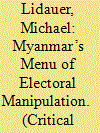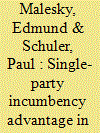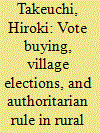| Srl | Item |
| 1 |
ID:
193134


|
|
|
|
|
| Summary/Abstract |
One decade after Myanmar’s military regime organized non-competitive elections that unexpectedly commenced a period of political reforms, the military leadership upended this transitional period with a coup based on a narrative of electoral fraud. Cancelling the November 2020 election results which had confirmed the voters’ preferences for civilian rule, the military has begun organizing fresh elections while concurrently leading a war against the population. Building on Schedler (2002) and the debate on authoritarian elections, this article analyses the military’s contemporary menu of electoral manipulation as a comprehensive set of intertwined strategies. It integrates the analysis of various technical elements of the authoritarian electoral process that are often only looked at in isolation. The article deconstructs the military’s election-related narratives as self-legitimation in a region where authoritarian elections are the norm. Despite considerable efforts to forge conditions in their favor and create an aura of legitimacy, however, Myanmar’s military does not appear very imaginative in this undertaking, but employs a retrograde toolbox in a brutal manner. Whether this strategy is successful will not depend on the authoritarian leaders’ skills alone, but also on recognition from domestic, regional and international audiences which the junta’s performance seeks to achieve.
|
|
|
|
|
|
|
|
|
|
|
|
|
|
|
|
| 2 |
ID:
105269


|
|
|
| 3 |
ID:
120323


|
|
|
|
|
| Publication |
2013.
|
| Summary/Abstract |
What purpose do elections serve in authoritarian states? Scholars often describe these elections as "safety valves" to contain opposition groups. Though we often use this safety valve terminology, it remains an abstract concept without sufficient empirical testing. In a study of the 2009 local elections in Morocco, I show how this safety-valve process played out in real politics. This article makes the case that the Moroccan regime undertook activities in an effort to weaken the Justice and Development Party (PJD), an Islamist opposition party. Using 20 original interviews and over 100 Arabic primary documents, I delineate the ways in which regime elites manipulated electoral rules and formal institutions, especially loyalist political parties, in an attempt to undermine the Islamists' power between 2007 and 2010. I also examine how Arab Spring unrest turned back many of these efforts, empowering the PJD to secure a sweeping victory in the 2011 parliamentary elections. I conclude by discussing how scholars may reconsider safety-valve elections in authoritarian regimes as sequenced processes rather than one-time events. This case study of Morocco generates a new theory of safety-valve elections testable in other contexts.
|
|
|
|
|
|
|
|
|
|
|
|
|
|
|
|
| 4 |
ID:
171198


|
|
|
|
|
| Summary/Abstract |
Why do voters in single-party regimes express support for the ruling party in such large numbers? Scholars offer three sets of explanations: 1) Support is manipulated by regime leaders or falsified by frightened voters; 2) Support is due to genuine popularity or “performance legitimacy”; 3) The incumbent party holds an extreme incumbency advantage due to voters’ certainty about their candidates’ policy positions or access to state resources. Despite the impressive theoretical development in this literature, these arguments have not been subjected to a research design capable of examining the relative importance of each of these factors. We use a unique survey experiment on nearly 42,000 Vietnamese citizens over three years that reduces the threat of preference falsification and allows us to isolate voter's true preferences as much as possible. While we find some evidence for all three explanations, we find substantial support for incumbency bias. An important subset of Vietnamese voters—those inclined to vote for non-party candidates—sincerely favor the party under conditions of uncertainty about the candidates’ policy stances or experience in the legislature.
|
|
|
|
|
|
|
|
|
|
|
|
|
|
|
|
| 5 |
ID:
120589


|
|
|
|
|
| Publication |
2013.
|
| Summary/Abstract |
Village elections are a democratic institution in one of the most resilient authoritarian regimes in the world. The Chinese Communist Party (CCP) has promoted village elections over the past twenty years, but not elections at higher levels. I present a game-theoretic model in which candidates would engage in vote buying when competing in a small electorate but not when competing in a larger electorate. The model's equilibrium outcome implies that the logic of China's introduction of village elections inherently limits this democratic reform to the grassroots level. Elections for higher levels of government would be dangerous to the regime because they would lead candidates to create substantive policy platforms and political organizations. Thus, rather than being an experiment that has failed to lead to further reforms, village democracy is self-limiting by design.
|
|
|
|
|
|
|
|
|
|
|
|
|
|
|
|